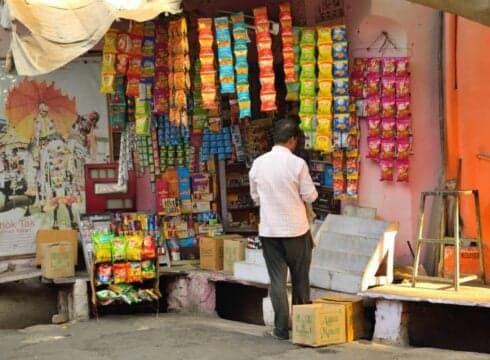Three out of four kiranas do not have exposure to technology platforms, says Redseer
Udaan, ShopX, Jumbotail and NinjaKart have been popular for their supply chain solutions
India’s retail sector is set to grow to $1.3 Tn by the fiscal year 2025, Redseer added
Inc42 Daily Brief
Stay Ahead With Daily News & Analysis on India’s Tech & Startup Economy
The neighbourhood pop and mom stores which have been a lifeline during the pandemic, woefully fall short when it comes to exposure to technology platforms for payments or procurement. A report by Bengaluru-based Redseer Consulting has revealed that three out of four kiranas fall into this basket.
The report, exclusively shared with the Economic Times, highlighted that the remaining 25% stores lack tech-enabled procurement and payment processing. However, this in no way means that the digitisation of kirana stores is slow.
Digital payments platforms like Google Pay, Paytm and PhonePe have emerged as popular solutions. Besides this, private companies like PineLabs enable more digital transactions through their smart point-of-sales machines, Abhishek Chauhan, associate partner at Redseer Consulting told Inc42. These smart PoS solutions are bundled with facilities which can process any kind of digital payments and apps like inventory management solutions and others that help kiranas to become more digitised, he added.
B2B ecommerce Udaan and wholesale-retail service provider Metro Cash And Carry have also been popular. Chauhan highlighted that B2B businesses like Udaan, ShopX, Jumbotail and NinjaKart, among others, have been popular supply chain solutions. He noted that these startups are pivoting kiranas in a big way and are significantly working with them on last-mile deliveries, maintaining supply chains, effective inventory management, credit and more.
Meanwhile, he also noted that looking at the reach of kiranas in Tier II and beyond regions, several B2C ecommerce companies have also been shaping up their models to include kirana stores in their business. With this, pop and mom stores have turned into a point of sales for ecommerce businesses.
“Through all these evolutions, which is happening, the entire kirana inventory is getting digitised. So when you collate the inventory varying within, say, 10 kiranas which are in a hyperlocal area versus inventory with one kirana, your power to deliver a particular item to a particular item increases 10-folds. From that perspective, the combined effect of tech enabling digitaiting of Kirane inventory..it kind of enabled significant value additions,” Chauhan said.
Besides this, he also mentioned B2B startup Khatabook, which is enabling digital bookkeeping services for these local neighbourhood stores.
According to the report, India’s retail sector is set to grow to $1.3 Tn by the fiscal year 2025 from the current $1 Tn. The report highlights that the unorganised retail share in the segment will fall from 84% to 77% in the next five years, but it will continue to be a dominant category.
However, the fast-moving consumer goods (FMCG) will continue to make for 90% of the sales in the sector, the company added. The report also noted that organized retail, both online and offline, is poised to grow from 16% to 22%.
Commenting on the report, Sujeet Kumar, cofounder of B2B marketplace Udaan, said that these neighbourhood kirana stores are irreplaceable. “The only way to create a large business in the retail space is to enable these shops with technology to help them improve demand forecasting, inventory management and cut supply chain costs,” he added.
{{#name}}{{name}}{{/name}}{{^name}}-{{/name}}
{{#description}}{{description}}...{{/description}}{{^description}}-{{/description}}
Note: We at Inc42 take our ethics very seriously. More information about it can be found here.


